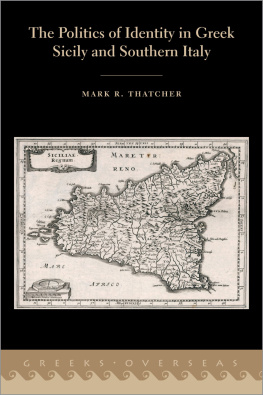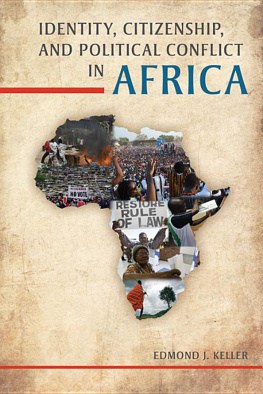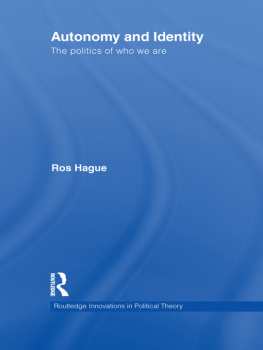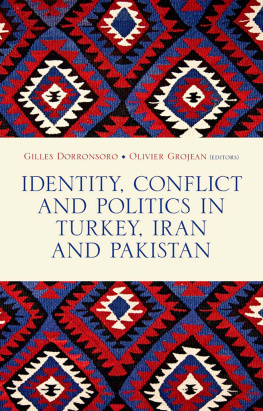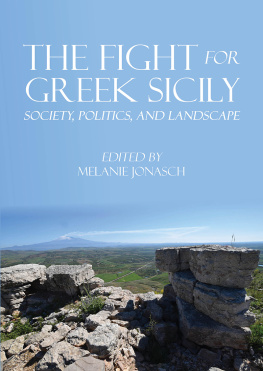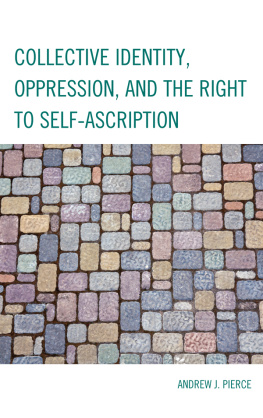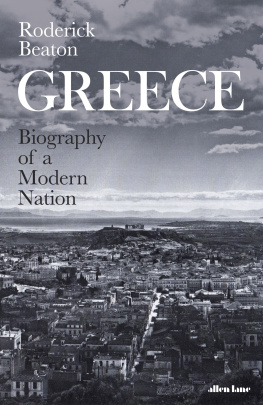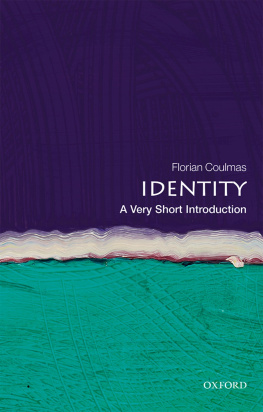The Politics of Identity in Greek Sicily and Southern Italy
GREEKS OVERSEAS
Series Editors
Carla Antonaccio and Nino Luraghi
This series presents a forum for new interpretations of Greek settlement in the ancient Mediterranean in its cultural and political aspects. Focusing on the period from the Iron Age until the advent of Alexander, it seeks to undermine the divide between colonial and metropolitan Greeks. It welcomes new scholarly work from archaeological, historical, and literary perspectives, and invites interventions on the history of scholarship about the Greeks in the Mediterranean.
A Small Greek World
Networks in the Ancient Mediterranean
Irad Malkin
Italys Lost Greece
Magna Graecia and the Making of Modern Archaeology
Giovanna Ceserani
The Invention of Greek Ethnography
From Homer to Herodotus
Joseph E. Skinner
Pindar and the Construction of Syracusan Monarchy in the Fifth Century B.C.
Kathryn A. Morgan
The Poetics of Victory in the Greek West
Epinician, Oral Tradition, and the Deinomenid Empire
Nigel Nicholson
Archaic and Classical Greek Sicily
A Social and Economic History
Franco De Angelis
Myth, Locality, and Identity in Pindars Sicilian Odes
Virginia M. Lewis
The Politics of Identity in Greek Sicily and Southern Italy
Mark R. Thatcher

Oxford University Press is a department of the University of Oxford. It furthers the Universitys objective of excellence in research, scholarship, and education by publishing worldwide. Oxford is a registered trade mark of Oxford University Press in the UK and certain other countries.
Published in the United States of America by Oxford University Press
198 Madison Avenue, New York, NY 10016, United States of America.
Oxford University Press 2021
All rights reserved. No part of this publication may be reproduced, stored in a retrieval system, or transmitted, in any form or by any means, without the prior permission in writing of Oxford University Press, or as expressly permitted by law, by license, or under terms agreed with the appropriate reproduction rights organization. Inquiries concerning reproduction outside the scope of the above should be sent to the Rights Department, Oxford University Press, at the address above.
You must not circulate this work in any other form and you must impose this same condition on any acquirer.
Library of Congress Control Number: 2021940309
ISBN 9780197586440
eISBN 9780197586464
DOI: 10.1093/oso/9780197586440.001.0001
To my grandfather, Curt Roy, whose passion for history taught me to be a lifelong learner, to always be curious, and to keep wanting to learn more.
Contents
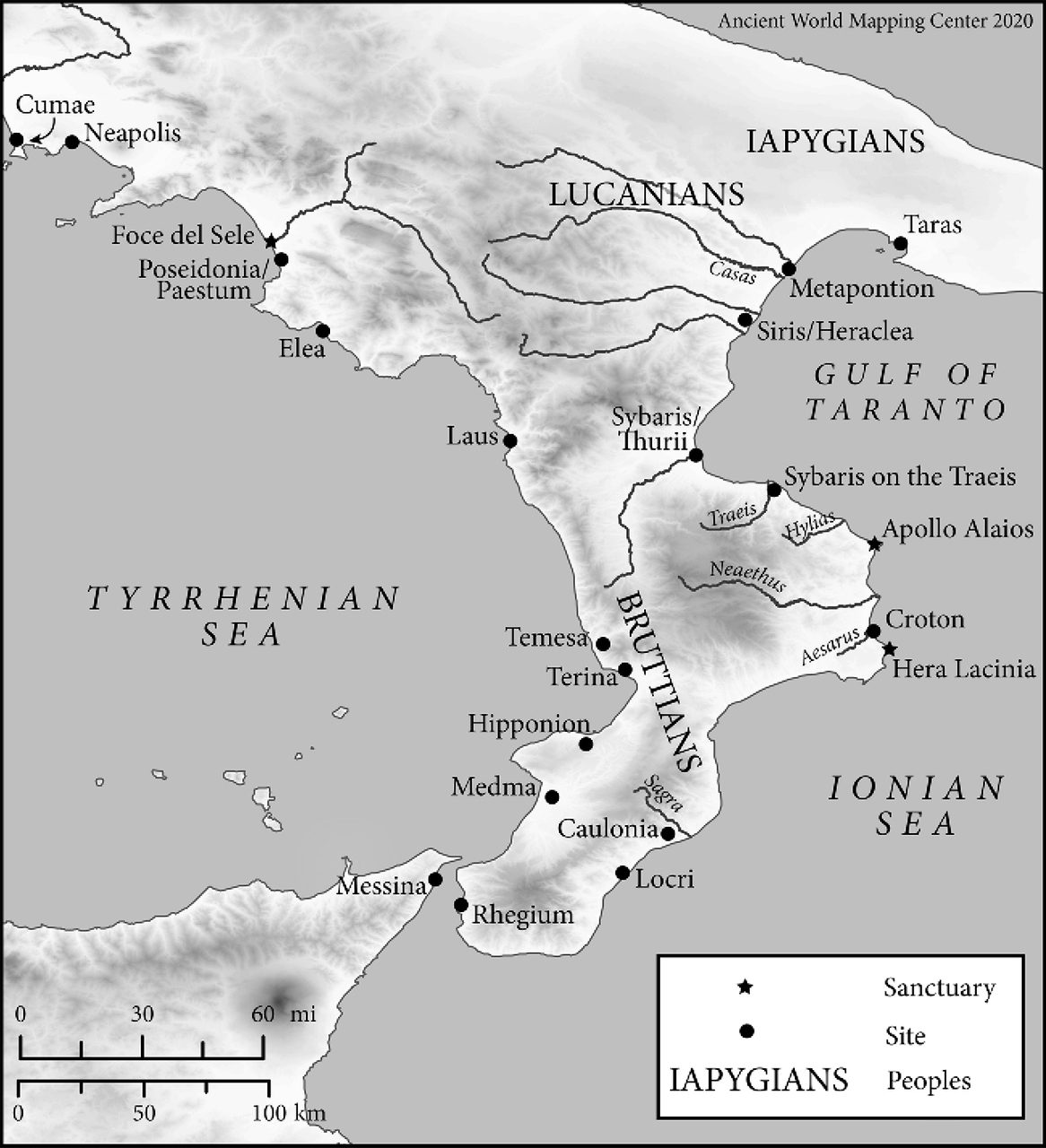
Fig. 0.1 Map of southern Italy. By the Ancient World Mapping Center.
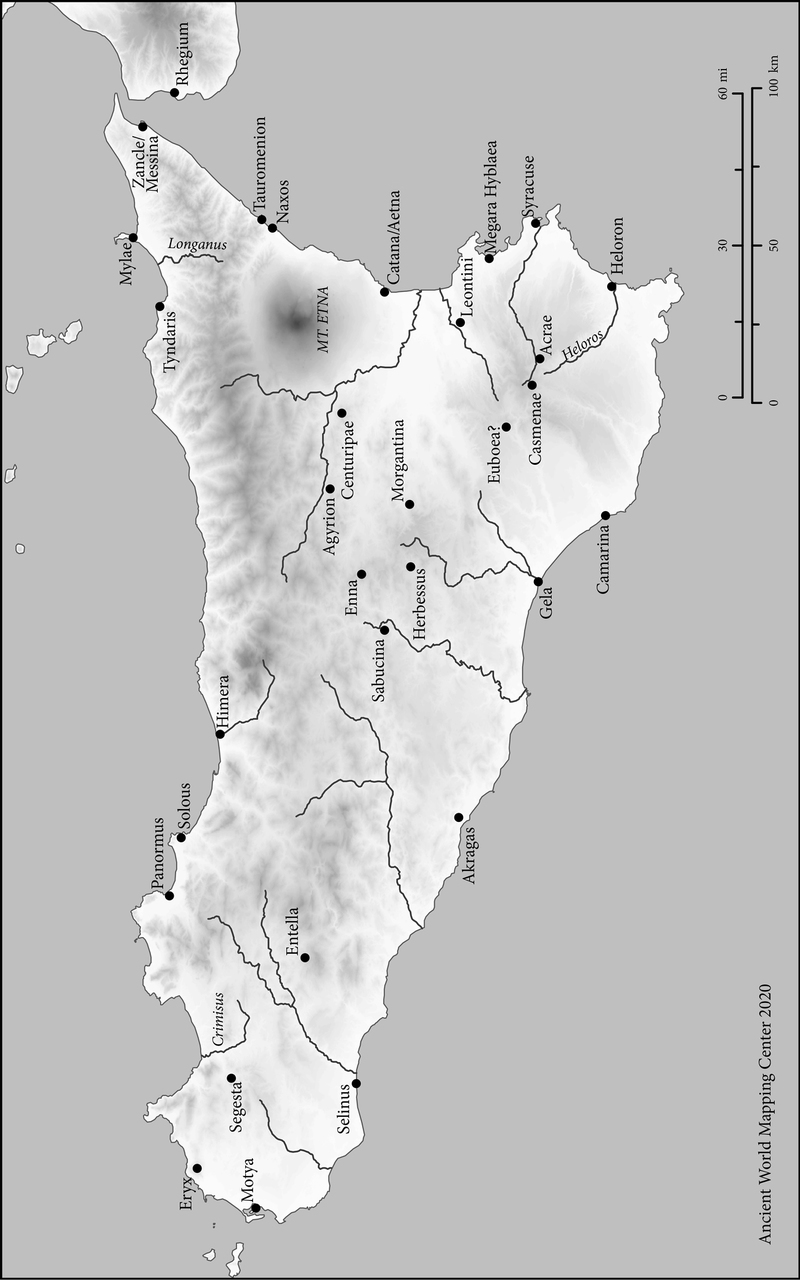
Fig. 0.2 Map of Sicily. By the Ancient World Mapping Center.
this book has been shaped by innumerable teachers, colleagues, and friends over the last two decades, beginning with my first teachers: my parents, Cathy and Steve Thatcher, and my grandfather, Curt Roy. My interest in Sicily was first piqued by my trip with the Intercollegiate Center for Classical Studies in Rome in the fall of 2002; one view of the lights of Messina across the Straits from Reggio, and I never looked back. This project began as a dissertation at Brown University, and I am grateful to my committee members, Sue Alcock and David Konstan; Chris Witmore also gave helpful advice on archaeological matters. Thanks are due above all to my adviser and mentor, Kurt Raaflaub, whose generous willingness to read drafts, provide expertise, and offer advice was critical both during the dissertation process and ever since. The dissertation became a book only through the support of Carla Antonaccio, who believed in this book even before I did, and Stefan Vranka at Oxford University Press, who was willing to wait for it. Both of them gave much-needed assistance and advice over the years. I am grateful also to the anonymous readers for the press, whose critical eyes vastly improved the final product.
Writing is a lonely endeavor, and so the conversation, companionship, and support of my colleagues in the Boston College Department of Classical Studies, especially Kendra Eshleman, Gail Hoffman, and Chris Polt, were and are particularly important. I similarly benefited from the warm encouragement of past colleagues and friends at the University of Arizona, Creighton University, The Ohio State University, and Brown University. The twice-annual meeting of junior faculty in New England known as MACTe has been a source of friendship and advice; several chapters were workshopped with this group and emerged better for it.
On the other hand, writing is also a collaborative process. I am grateful to Carla Antonaccio, Radcliffe Edmonds, Virginia Lewis, Dominic Machado, Brian McConnell, Kathryn Morgan, Nigel Nicholson, Kurt Raaflaub, and Carrie Sulosky Weaver, who have all been valuable interlocutors over the years and whose comments on various parts of the project at different stages were useful. Hanne Eisenfeld also read virtually every word of this book, often many times, and always with helpful suggestions. Needless to say, all remaining errors are my own. Brian McConnell was kind enough to welcome me onto his excavation team at Palik, Sicily, in 2017, an experience from which I learned a lot, and to assist in many other ways. Finally, I owe a considerable debt to my teachers, especially Charles Fornara, Jinny Jensen, and Robert Wallace, who were not involved in this project but have nevertheless deeply influenced my approach to the ancient world.
Generous support for this project was given by the Deans Office of the Morrissey College of Arts and Sciences at Boston College and by the Behrakis Endowment for Hellenic Studies. I particularly thank Mary Crane for her uncanny ability to find untapped pots of money, and both Kendra Eshleman and Gail Rider for further assistance in this area. A Tytus summer fellowship at the University of Cincinnati supported early progress. Two separate stays at the Fondation Hardt in Vandoeuvres, Switzerland, one of which was funded by a bursary, vastly accelerated the revisions to the manuscript, and a semester of leave from teaching through BCs Faculty Fellowship program enabled its completion.
Critical assistance in securing the images was given by Gioconda Lamagna, Laura Maniscalco, Brian McConnell, Antonella Pautasso, Chris Strauber, and Carrie Sulosky Weaver. Lindsay Holman and her team at the Ancient World Mapping Center drafted the area maps, and Daniel Weiss drew the city plans. Although I have drawn on the relevant Loeb volumes and other widely used translations, especially .
Special thanks are due to Gail Rider, administrator extraordinaire, who makes the thorniest practical problems easy, and to the Interlibrary Loan Department at the Boston College Libraries, whose staff never failed to find the most obscure books and articles. This book was completed during the COVID-19 pandemic, and I want to thank the Boston College staff members in particular for their valiant work in keeping the libraries open and academic work continuing under these most difficult circumstances.

